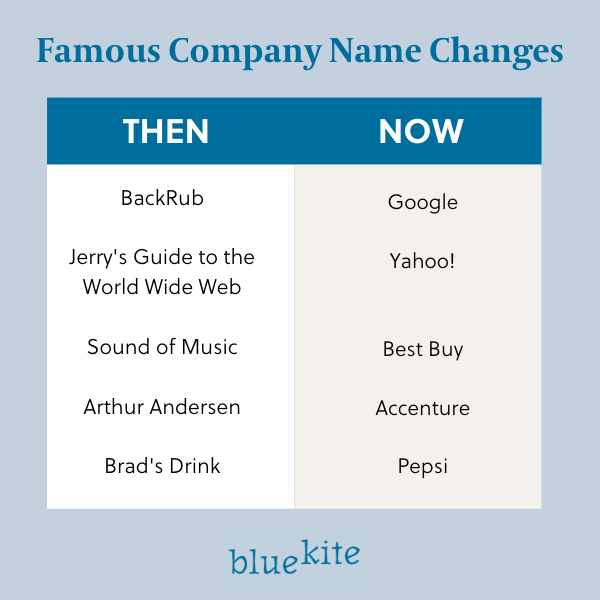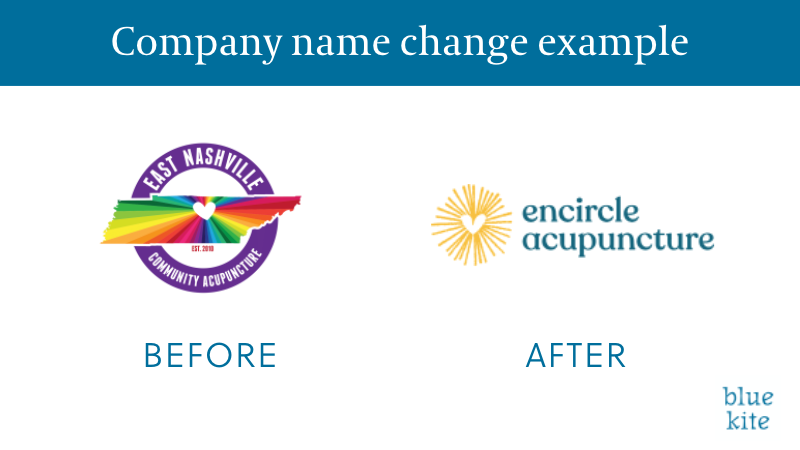Considering changing the name of your business?
It’s not something to take lightly. A company name change is a delicate process that must be handled properly.
However, there are some instances where making this kind of change is important – even critical – to a business. In fact, there are times we have made this recommendation our clients because it is necessary for the strategic direction of their brand.
Names that work at a company launch aren’t always the best as a company grows or changes. In fact, sometimes brand might be holding you back from where you want to go.
Just take a look at some famous examples of companies that have changed their name.
- Google was once Back Rub.
- Yahoo! Was originally Jerry’s Guide to the World Wide Web.
- Before it was Best Buy, it was Sound of Music.
- Accenture was originally Arthur Andersen.
- PepsiCola started out as Brad’s Drink.
Do you think these companies would have reached the same level of success if they had stuck with their original names?
Probably not.
That’s why your brand name matters. A lot.
And it pays to get it right.
After all, your name is arguably the most important component of your company’s brand.
Your business name the first thing people mention when talking about your company. It’s uttered hundreds of times a day by you and your team and it’s plastered on all of your materials.
Your name can either open doors or get them slammed in your face. It can cause people to sit up and take notice or completely ignore you.
The question is – is your name sending the right message?
Let’s take a look.
Top Reasons to Change Your Company Name
So how do you know if you should change your name? Here are some top reasons we recommend a company name change.
1. You suffer from brand confusion.
Does your company ever get calls for a business with a similar name?
Or, do people ever mistake your company for another business with one that does something else entirely?
Or, do you have trouble with people constantly misspelling or mispronouncing your name?
If so, your company may suffer from brand confusion. This can be especially problematic if brand confusion occurs with other companies within your own industry.
In the case of our client, there are three competitors in their market that all use strikingly similar acronyms starting with the same letter. Two of the companies even share the same logo colors.
So, how does a potential customer know the difference?
If your brand name is not distinct, it means your marketing efforts have to work even harder to position your brand in the marketplace. In other words, be prepared to outspend the competition.
2. You’ve changed industries, products or strategies.
Businesses often pivot to respond to market positions. Maybe that means you’ve added a new product or service line. Or perhaps you’ve changed industries all together.
If you change core products or services or have moved into an entirely new industry, you might need to consider a new name – especially if your brand specifically mentions the work you do.
If that’s the case, your name might be a hinderance as you go after a new market.
In some cases, a name is flexible enough that it can go after a new market. Virgin, for example, has worked well for airlines, hotels, mobile phones and even space travel. But, there are few brands that have this level of flexibility.
3. It’s a legacy name that no longer works.
Many companies choose to name their organization after their founder. This is especially common with professional services firms, ranging from the financial and legal sectors to architects and creatives.
However, this can pose problems with founders or partners leave – or perhaps are long since deceased. Sometimes, companies named after people can stand the test of time. Walt Disney, McDonald’s, Morgan Stanley, Johnson & Johnson and Boeing are all famous brands named after company founders.
But, if your organization doesn’t have that level of name recognition or legacy, founder-based names might be problematic for you – especially if the founder is gone.
4. It’s too closely tied to a location.
Many local businesses choose to brand their company based on their location, such as Anytown Dentist or 4th Avenue Flowers. These names do little to differentiate the company and instead only point to a location.
If you’re the only florist or dentist in town, maybe this is fine. But, for companies in larger areas, this doesn’t help you stand out. Plus, if your company has plans to expand to other locations or regions, a name change will be necessary.
That’s exactly why we helped our client, Encircle Acupuncture, rename and rebrand their business. Their former name was tied to East Nashville. But as they prepared to add a second location in another part of the city, the name no longer worked.
Now, their new name works for any location and is well positioned to help them grow.
5. It’s too generic or mediocre.
Your name should be one of your company’s distinguishing factors. However, if your name is too generic or unmemorable, it might be time to let it go.
Why?
Your brand name should be “sticky” in the minds of your audience and help you stand out from the competition. However, if your name is too boring, bland or generic, you’ll have a tough time gaining the attention of your target audience.
Acronyms are a prime example. Name three letters and I can bet there are at least a dozen companies that are branded under that moniker.
The problem is that many acronyms have little meaning. We’ve even worked with companies where the letters in their name don’t even stand for anything!
Certainly, there are situations where acronyms work – IBM, AT&T and UPS are common examples. However, an acronym doesn’t give you a competitive edge.
Another trap is using generic words or phrases to describe your industry or work – Quality Consulting, Quick Car Wash, Top Notch Printing, etc. If your name simply describes your industry, that’s not helpful to customers. It doesn’t do enough to signal to customers why they should choose you.
This category is the trickiest of all. It can be easy to simply settle with the name you have. You might be thinking, “it’s good enough, right?”
But, if you want to build a game-changing business, you need a breakthrough brand that causes people to sit up and take notice.
Before Making a Company Name Change
If you look at this list, you might think that every company should rename.
Far from it.
Renaming doesn’t come without it’s risks and challenges. It’s imperative that the benefits far outweigh the costs of doing so.
Before you decide to rename your business, you must take the following steps:
1. Have a clear brand strategy.
If you don’t have clear, brand strategy for your company, start with that first.
An undifferentiated business only leads to a boring, bland brand. You must clearly articulate your brand’s Core Why. In other words, you must have a clear understanding of why you exist and how your organization meets the Core Need of your target audience.
2. Allocate appropriate resources.
Although your name might be hurting you, renaming your business takes time and money to do it right.
Resist the urge to create a company contest or plug some ideas into a name generating tool. Invest the resources to partner with a team who can help you craft a name that serves as a launching pad for your brand story.
It pays to get this right. A failed renaming effort can set you back even further. Remember when Netflix rebranded as Quickster? You don’t want that to happen to you.
Find a company that specializes in brand strategy and brand naming. The right partner will ensure you land on a brand name that will position you for success.
3. Fix what’s broken.
A new name cannot fix a broken business.
Yes, if your company was embroiled in scandal, you might be a position where renaming would be advantageous.
However, a new name without wholesale changes is simply putting lipstick on a pig. Make sure a new name reflects who you are as a company – not simply trying to cover up a blunder or repackage the same, old thing.
Change is hard – especially when it comes to company’s brand name. But, it some cases, it can be an incredibly important step to reaching the next level in your business.
Is a Name Change Right for Your Business?
Let us help you decide. Through our brand assessment and brand strategy process, we can help you determine if now is the right time to change your company name.
And if it is, our team of brand strategists and naming experts can help you land on the right name to talk your business to new heights.
Ready to chat? Contact us here. We’d love to talk to you to see if we’re the right fit to help you build your new brand.
This article was originally published on April 4, 2017. Updated and expanded on May 23, 2022.







